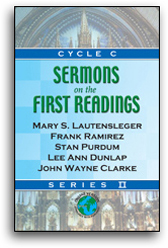SermonStudio
A "Somebody Done Somebody Wrong" Song
Sermon
Sermons on the First Readings
Series II, Cycle C
Humpty Dumpty sat on a wall; Humpty Dumpty had a great fall.
All the king's horses and all the king's men couldn't
put Humpty Dumpty together again.
This is a nursery rhyme we learned as children, and somewhere along the line in history class we were taught that its composer, "Mother Goose," was, in fact, a political satirist. If we look between the lines of these playful rhymes we will find some kind of hidden message poking fun at royalty. (I guess you had to be there to get the joke.)
All the king's horses and all the king's men couldn't
put Humpty Dumpty together again.
This is a nursery rhyme we learned as children, and somewhere along the line in history class we were taught that its composer, "Mother Goose," was, in fact, a political satirist. If we look between the lines of these playful rhymes we will find some kind of hidden message poking fun at royalty. (I guess you had to be there to get the joke.)


